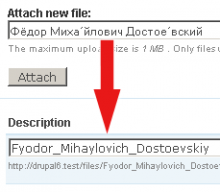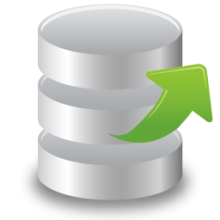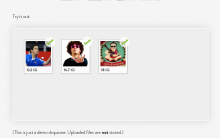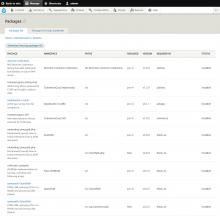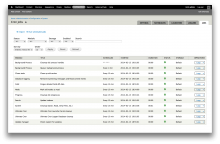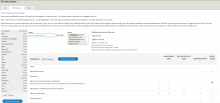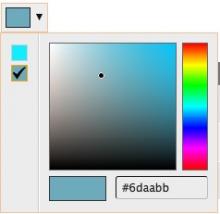Add functionality and customize your Drupal application with thousands of projects contributed by our amazing community.
A module is code that extends Drupal's by altering existing functionality or adding new features. You can use modules contributed by others or create your own. Learn more about creating and using Drupal modules.
Module description
The link module provides a standard custom content field for links. With this module, links can be easily added to any content types and profiles and include advanced validating and different ways of storing internal or external links and URLs. It also supports additional link text title, site-wide tokens for titles and title attributes, target attributes, CSS class attribution, static repeating values, input conversion, and many more.
Requirements / Dependencies
- Drupal 6: Custom content module (CCK)
- Drupal 7: Fields API is provided already by core [no dependencies].
- Drupal 8: Link module is in core now. No module installation needed. Yay! Don't forget to activate it. It's deactivated by default.
INFO Since some misleading user reports we need to clarify here - Link module is NOT about to add links to any menus or the navigation nor primary/secondary menu. This can be done with default menu module (part of Drupal core). The Link module provides an additional custom field for storing and validating links to be added with any content type, which means another input block additional to your text-body, title, image and any other input you can make on new content creation.
Provides one-way string transliteration (romanization) and cleans file names during upload by replacing unwanted characters.
Generally spoken, it takes Unicode text and tries to represent it in US-ASCII characters (universally displayable, unaccented characters) by attempting to transliterate the pronunciation expressed by the text in some other writing system to Roman letters.
This module is designed to provide a way to export large amounts of data from views. It provides a display plugin that can rendered progressively in a batch. Style plugins are included that support exporting in the following types:
- CSV
- Microsoft XLS
- Microsoft DOC
- Basic TXT
- XML.
Advanced usage
This module also exposes a drush command that can execute the view and save its results to a file.
drush views-data-export [view-name] [display-id] [output-file]
Requirements
The batched export functionality of this module requires a MySQL database.
This module also requires version 2.7 or higher of views.
Similar modules
- Views Bonus Pack includes an export submodule that allows exports, but is not scalable for large data sets.
- Views Datasource allows exporting to XML/JSON among many others, but is geared towards small exports.
- Services Views provides ways of exporting views results as XML, JSON and CSV using Services.
This simple module allows you to specify some additional attributes for menu items such as id, name, class, style, and rel.
You should use this module when
File entity provides interfaces for managing files. It also extends the core file entity, allowing files to be fieldable, grouped into types, viewed (using display modes) and formatted using field formatters. File entity integrates with a number of modules, exposing files to Views, Entity API, Token and more.
Provides a field type that can reference arbitrary entities:
- A generic entity reference field
- Four widgets:
- Two implemented on top of the Options module (Select and Radios/Checkboxes),
- Two autocomplete widgets (one with one text field per entry, one tag-style with comma-separated entries in the same text field)
- Two formatters:
- A "Label" formatter, with optional link that displays the label of the referenced entity (the node title, the user name, etc.)
- A "Rendered entity" formatter, that renders the references entity using a configurable view mode
- Integration with Views (for both forward and backward references)
- Integration with Entity Metadata (and as a consequence with Search API and the like)
- Integration with Devel generate
- Integration with Feeds and Migrate (>= 2.3) for painless data import
This modules depends on Entity API and CTools.
Modules extending Entity reference functionality:
What is this?
This is the Varnish purger for the Purge module.
Goal of this module is to provide a generic entity browser/picker/selector. It can be used in any context where one needs to select few entities and do something with them.
🇺🇦
|
This module is maintained by Ukrainian developers.
|
This module addresses the General Data Protection Regulation (GDPR) that came into effect 25th May 2018, and the EU Directive on Privacy and Electronic Communications from 2012. It provides a banner where you can gather consent from the user to store cookies on their computer and handle their personal information.
The module offers several methods for getting consent: Consent by default, opt-in and opt-out. It's also possible to only display the banner for visitors from the EU.
GDPR requires that you ask consent from your visitors if you store or process their personal details, such as the IP address or identifiable cookies.
Drupal integration for DropzoneJS - an open source library that provides drag’n’drop file uploads with image prev
Introduction
Ever experienced that your site's configuration was overridden, by the configuration on the file system, when running a drush cim?
Scheduler gives content editors the ability to schedule nodes to be published and unpublished at specified dates and times in the future.
The Easy Breadcrumb module updates the core Breadcrumb block to include the current page title in the breadcrumb. The module also comes with additional settings that are common features needed in breadcrumbs.
Provides a manual alternative to Composer for Drupal 8+ users.
Replaces administrative overview/listing pages with actual views for superior usability.
Features
- Filter all administrative views via AJAX.
- Perform any kind of bulk/mass operations on items in administrative views.
- Filter content by title, node type, author, published status, and/or vocabulary.
- Filter comments by title, author, node title, or published status.
- Filter users by name, ban/blocked status, or user roles.
A Drupal module that lets you use special placeholders (tokens) as filters.
This module provides a CSV encoder for the Drupal Serialization API. This enables the CSV format to be used for data input and output in various circumstances. For example:
The Ultimate Cron handling for Drupal.
Runs cron jobs individually in parallel using configurable rules, pool management and load balancing.
8.x-2.x
This is a port of the 7.x-2.x branch to Drupal 8, using config entities and the Drupal 8+ plugin system.
See https://befused.com/drupal/ultimate-cron/ for an overview on how the module works and how to discover jobs.
2.9 READY!
Ultimate Cron 7.x-2.9 is out now.
Ultimate Cron 1.x documentation can be found at https://drupal.org/node/1666944
The old project page for Ultimate Cron 1.x can be found at https://drupal.org/node/2195381
Changes
- No more dependency to Background Process. Ultimate Cron now works without Background Process. However, Background Process is still supported for true parallelism
- Refactored to use cTools plugins, making it easier to extend Ultimate Cron.
- Now includes the daemonizer and queue throttling features, previously found in the modules Ultimate Cron Daemonizer and Ultimate Cron Queue Scaler
- Hopefully a more robust lock and logging mechanism.
- Integration with nodejs for live update on cron page
- Nagios support has not been re-implemented
Upgrade path from 7.x-1.x and previous
Upgrading from an earlier version of Ultimate Cron to a 7.x-2.x version has some caveats. See the documentation.
Plugins
Ultimate Cron is built upon 4 plugin types.
- Settings: - plugins that provide custom settings for jobs (bundled: general, queue).
- Schedulers: - plugins that provide a mechanism for whether or not a job should run at a certain time (bundled: simple, crontab).
- Launchers: - plugins that provide a way of launching jobs (bundled: serial, background_process).
- Loggers: - plugins that provide a logging backing for job status (bundled: database, cache).
Ultimate Cron 7.x-2.x documentation can be found at https://drupal.org/node/2195383
Features
- Works out-of-the box in most cases (or aims to)
- Parallel execution of cron jobs
- Configuration per job (enable/disable, rules, etc.)
- Multiple rules per cron job
- Pool management and load balancing using Background process
- Support for Drupal Queues
- Overview of cron jobs
- Log history of cron jobs
- Status/error messages per cron job, providing easy debugging of troublesome cron jobs
- Uses hook_cronapi() (Elysia Cron compatible, NOT 2.x, please use hook_cron_alter() for similar functionality)
- hook_cron_alter() for easy adding/manipulating cron jobs
- Poormans cron with keepalive a granularity of 1 minute
- Drush support (list, start, enable/disable jobs from the command line)
This module is here to alleviate frustration when trying to manage permissions in Drupal. By providing a better permissions interface hopefully a few innocent keyboards and mice can be saved.
The migrate_plus project provides extensions to core migration framework functionality, as well as examples.
Slick is a powerful and performant slideshow/carousel solution leveraging Ken Wheeler's Slick carousel.
Color Field is simple field that use a hexadecimal notation (HEX) for the combination of Red, Green, and Blue color values (RGB). Opacity is also support and can be disabled/enabled per field instance.
Variable module provides a registry for meta-data about Drupal variables and some extended Variable API and administration interface.
This is an API module so it must be installed only when other modules require it.
Module Developers: Please declare your variables.
Add-ons for module developers here: Variable Extra
This is a nice introduction to the module by Lullabot, Module Monday: Variable.
¿Drupal 8? #2146779: Port Variable to Drupal 8
Why?
- So other modules can know about your module's variables and they can be translated, exported, used in views, etc.
- You'll get automatic variable edit forms, tokens, access control and uninstall for free
- Your module's variables will be allowed for Variable Realms being able to get values for each language (Internationalization) or Domain (Variable Domain)
Pages
 Support for Drupal 7 is ending on 5 January 2025—it’s time to migrate to Drupal 10! Learn about the many benefits of Drupal 10 and find migration tools in our resource center.
Support for Drupal 7 is ending on 5 January 2025—it’s time to migrate to Drupal 10! Learn about the many benefits of Drupal 10 and find migration tools in our resource center.